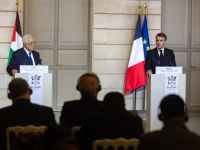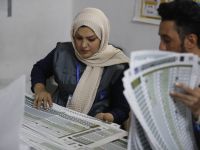By Izzat Ramini
Albawaba.com - Ramallah
The idea of separation between the West Bank and the Green Line is both an old and new issue at the same time. The idea surfaces whenever major events, such as the current Intifada, are in the news. The Israelis recognize the extent of the potential danger, particularly the security threat which the Palestinians may pose in situations like this.
Likud leader Ariel Sharon addressed the issue of separation on many occasions during the 1987 uprising and has been politically convinced with the need of implementing it unilaterally by Israel regardless of Arab, international or Palestinian reaction. It is vitally important that this is agreed upon with the Palestinian side, and herein lies the difference between Sharon’s and Barak’s point of views.
After the uprising, Israeli Prime Minister Ehud Barak’s concept regarding separation has changed, and he has become convinced of Sharon’s point of view and the need for to adopt it. His voice regarding the separation has recently become louder. This has led to various reactions at different levels.
The Israeli newspapers and its writers took part in writing, analyzing and commenting on this subject, under the heading “Separation as Punishment”, Jedoun Eisheh wrote in Yadiot Ahranout that “it would be easy to suffocate the Palestinian economy simply by taking a political decision for separation.
“This is what is meant by separation, whereby Israel can impose punishment undercover, such as stopping the transfers of customs’ duties to the Palestinian Authority which Israel collects from the Palestinian importers.
“Israel can stop supplying the territories in the West Bank and Gaza with water, fuel and electricity. It can also prohibit Palestinians from importing and exporting goods, and thus stop money movements between the banks in the territories.”
According to Eisheh, the party that wants to take the decision for separation should think of the price it would pay in this regard. The Palestinians’ imports, amounting to $3.4 billions, come mostly from Israel. The Israeli construction sector depends heavily on the Palestinian labor force and does not have a readily available alternative work force. This is the least costly thing in the equation of separation.
“But the overall loss would be immense,” the columnist continued, “and the political and economic decision makers may not be able to withstand it. It should be noted that all the money involved in Palestinian exports, transfers from abroad, and income is tied with the Israeli economy and control. So the Israeli-Palestinian overlap is complex, and a unilateral decision to separate will deepen the current problems to such an extent that it will be difficult to foresee the final magnitude of the changes.”
How do Palestinians think about this?
Maher Al-Masri, the Palestinian Minister of Commerce and Economy says that this sensitive issue should be agreed on by both sides. Separation may take place while giving Palestinians control of all the Palestinian ports of entry such the River Jordan entry, Rafah and Gaza International Airport, and Gaza Port which are vital for Palestinian trade.
Al-Masri considers Israeli action as “a violation of the agreements.” He believes that they are intended to put more pressure on the Palestinian side and tighten the siege around it.
However, the Palestinian Authority has its own strategy if Israel goes ahead with this action.
“We have a comprehensive plan to deal with such an issue,” he said.
Responding to a question by Albawaba.com regarding Israel’s ability to implement the separation decision, the Palestinian Minister of Finance Zuhdi Nashashibi said that this is impossible to do directly and instantly, bearing in mind that there are 120.000 Palestinian men working at present in vital sectors in Israel.
“How Israelis could manage without these workers?” he asked, adding, however, that Palestinians should take the matter seriously and prepare themselves to do without the Israeli extortion of Palestinian workers and economy. “We could find jobs for our workers in the Arab countries,” he suggested.
Taysir Khaled, a PLO Executive Committee member, and a member of the Political Bureau of the Democratic Front for the Liberation of Palestine, said “we are in bad need of political and economic separation from the Zionist enemy. We have been struggling for that for a long time based on our assumptions that Israel would respect the international legitimate resolutions by withdrawing its forces back to the 67 line and accept the rights of the Palestinians that cannot be compromised.”
The separation, he said, should be carried out with this understanding. But what Barak is talking about is nothing but enforcing the occupation and annexation of territories. It exemplifies Israeli expansionist plans.
“Barak, for example, when talking about separation, speaks about annexing Jerusalem and the populated entry ports. I look at all of this as a new way of occupation - an occupation of large areas of our lands,” Khaled said.
According to the PLO official, Barak thinks that he is able to market separation from his point of view which is nothing but a declaration of war against the Palestinian people. The Palestinians will resist it by using all available means, endorsed by international rules and norms, as the legitimate rights of people living under occupation.
Also, the separation which Barak talks about on the economic side means only one thing, that it is keeping the markets in the West Bank and Gaza dependent on the Israeli economy. “We will also fight against this,” he vowed.
“The separation in our point of view is a requirement on the basis of our full political and economic independence, which guarantees our rights of national sovereignty within the framework of an independent state with Jerusalem as its capital.”
Abdul Jawad Saleh, member of Palestinian Legislative Council agrees with Khaled.
“We want separation on the basis of getting our national and legitimate rights and the withdrawal of the Israeli forces and ending the occupation of our land. We want to establish our independent and sovereign state with Jerusalem as its capital. This is the way we want separation,
“But the separation which Barak wants is considered as a way for collective punishment of the Palestinian people and a form of apartheid in the 21st. century. Barak wants to mark the borders of settlements and Jerusalem and wants to make the cities of the West Bank and Gaza isolated cantons. He wants to turn every Palestinian city and village into a big prison so that the separation will become an obstacle in the way of the people’s movement, transport and trade exchange.”
“I look at Barak’s decision, if implemented, as a war crime against humanity which we will resist by all means,” Saleh continued. “Unfortunately, the problem which Barak is talking about has not been faced by any actions or plans on the side of the Palestinian Authority. The Authority has not given consideration to the establishment of an economic community independent on Israel.”
Saleh describes economic dependency on Israel as a catastrophe, and criticizes Palestinian officials who talk about finding opportunities for the Palestinian workers and qualified manpower to work abroad.
“Is this rational thinking?” he protested, “Do we want our people and their capabilities to migrate instead of establishing development projects which can compass our workers and skilled manpower?”
“Israel wants to suffocate us economically and prohibit us from expanding our cities and villages to cope with the growing number of the Palestinian people. The Israelis are fully aware of what they want and so they plan for that carefully. Unfortunately, we have no leadership that plans or prepares programs,” he concluded.
For his part, leader of the of the Popular Front for the Liberation of Palestine– General Command in the West Bank and Gaza, Husam Arafat says Barak’s plan of separation is a new stage in his war against the Palestinian people and an attempt to intimidate them.
According to Arafat, the seperation plan “is an attempt to oppress the brave uprising and pressure the Palestinians to go back to the negotiating table to succumb to the conditions of Zionism and the United States of America.
On the other hand, the Israeli deputy Defense Minister, Afram Sneh who is the supporter of the unilateral separation, and the man who convinced the Prime Minister that this was the path to follow, ruled out the possibility of implementing such policy under the prevailing circumstances.
He told Albawaba.com in a telephone interview that the Israeli government is seriously studying all the possible outcomes of this plan in order to alleviate the extent of losses and guarantee the achievement of all goals at all levels of the upcoming separation.
© 2000 Al Bawaba (www.albawaba.com)







